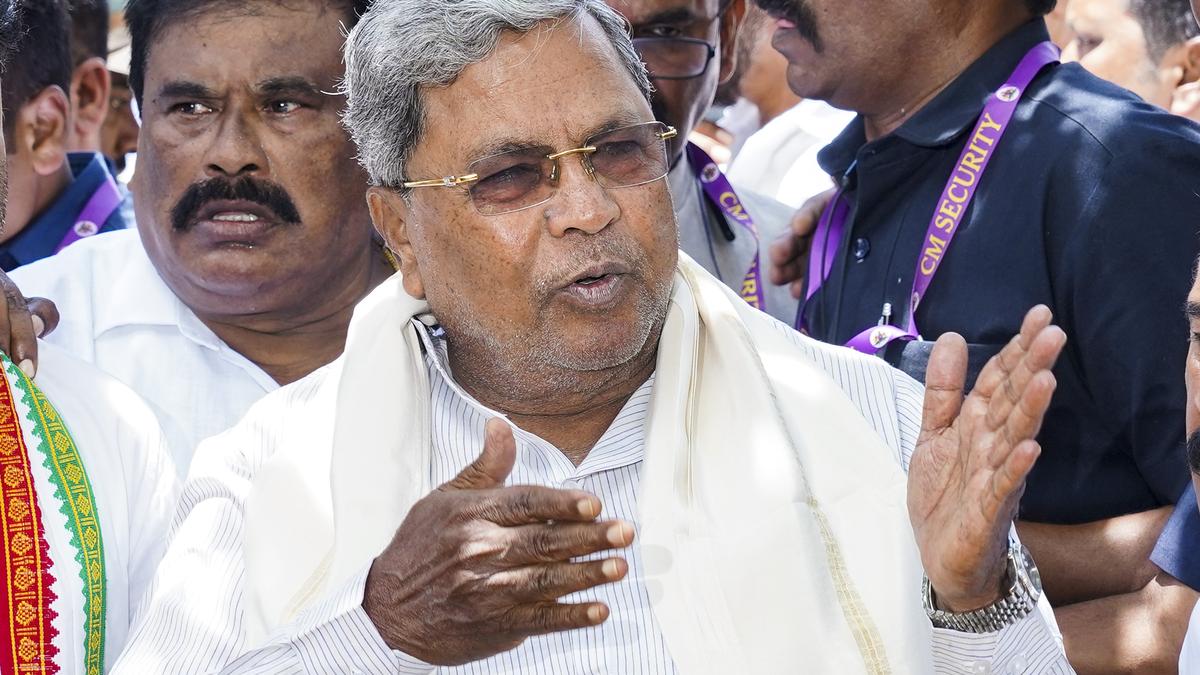
From political to personal in Karnataka Premium
The Hindu
The BJP and the Congress have different styles in building corruption narratives in Karnataka.
In 2010, Siddaramaiah led a 320-kilometre padayatra to Ballari in Karnataka to protest against illegal mining. Last year, he led from the front when the Congress launched its ‘40% commission’ campaign against the previous Bharatiya Janata Party (BJP) government, accusing it of corruption. Today, as Chief Minister of Karnataka, Mr. Siddaramaiah is fighting to save his largely “blemishless” image and it is arguably his toughest battle in the four decades of his political career.
Mr. Siddaramaiah’s troubles began when activists approached Governor Thaawar Chand Gehlot for sanction to file private court complaints against the Chief Minister, seeking a probe into the distribution of 14 sites by the Mysore Urban Development Authority (MUDA) to his wife. Last week, Lokayukta police registered an FIR against Mr. Siddaramaiah at Mysuru, following a court’s direction, to probe the alleged irregularities in the MUDA site allotment. On September 30, the Enforcement Directorate booked Mr. Siddaramaiah in connection with the case.
What is striking is that the BJP and Janata Dal (Secular) have adopted a radically different approach in attacking the Congress government relative to what the Congress had used to target them when they were in power.
In the past, many corruption-related allegations would be taken up during the legislature session to corner the government and would be followed up with protests outside the legislature. They would often result in the formation of inquiry commissions. However, today, allegations of corruption reach the Raj Bhavan on a regular basis and the Governor, in turn, seeks clarifications from the government. Even as private complaints are being submitted, leading to investigations, the two Opposition parties have also approached the Governor’s office, targeting individual ministers and leaders.
During the early days of the Congress government, the Governor’s office sent a letter to the Chief Secretary over an anonymous corruption complaint, allegedly by officials, against Agriculture Minister N. Cheluvarayaswamy. After the Lok Sabha elections this year, complaints to the Governor’s office seem to have increased. Apart from the Chief Minister, Heavy Industries Minister M.B. Patil and the family of Congress president Mallikarjun Kharge have been the target of complaints made to the Raj Bhavan over allotment of land. Mr. Kharge’s son, Priyank Kharge, is the Rural Development and Panchayat Raj Minister of Karnataka.
When it was in the Opposition, the Congress had mostly targeted the government as an entity. Though it set the ‘40% commission’ narrative against the BJP ahead of the Assembly elections in 2023, there were a few instances of complaints to the Governor’s office against individual ministers. During the alleged police sub-inspector recruitment scam, or the alleged scam in the Ganga Kalyana scheme, or the alleged irregularities in COVID-19 management, the party only critiqued the government. In 2023, the Congress put up posters with the face of the then Chief Minister, Basavaraj Bommai, along with a QR code which read ‘40% accepted here’, but the target was the BJP government. The only exception to this approach was when the Congress directly attacked the then Health Minister, K. Sudhakar, who had quit the party to join the BJP, as part of ‘Operation Kamala’.
Congress leaders say that the party has always attacked the BJP government based on issues and policies and has never targeted individual leader or their families. They say the local BJP leadership is adapting Prime Minister Narendra Modi’s style of making personal attacks during elections. This, they argue, has led to the “deterioration of political decorum and decency”.

Andhra Pradesh CM Chandrababu Naidu inaugurates CNG, PNG projects in Rayalaseema region. Andhra Pradesh has the unique distinction of being the second largest producer of natural gas in India, thanks to the Krishna-Godavari (KG) Basin, he says, adding the State will lead the way towards net-zero economy.










